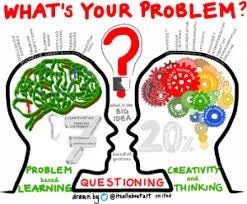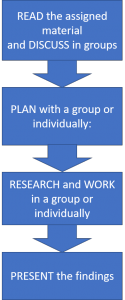Well, all right then, young people today do have lots of problems, we dont mean to trivialise the challenges facing them, but exposure to activities which develop crucial problem solving skills is limited.
The Victorians built the foundations for our education system.

The world was a different place back then with different expectations. Employers required vastly different skills than they do today. Consequently, we base tests on rote-learning of facts. We then expect students to regurgitate the facts (otherwise known as GCSEs) or tackle questions by clumping facts together in a coherent way (known as A levels). Examiners frame questions to expect a right answer. Anything less is wrong. Its binary.
The system is outdated and isnt preparing our students for the world of work. Business rarely has a right answer. We make compromises for the best solution. In the digital age, a rote knowledge of facts isnt required either. University undergraduates told me recently that the bedrock of facts for their essays is Wikipedia. If you need information or a fact, then google it. Rote memorisation is for losers!
Futurists say the working world will consist of people who instruct computers what to do, and others who carry out a computers instructions. No prizes for guessing who will earn the most (the programmers..save yourself the googling). The UK may have plummeted down the global education league tables,

but countries nearer the top also have issues. In the BBC documentary School Swap: Korea Style, even though the students obtain phenomenal exam results, it comes at a price. One cost is the associated mental health issues of the pressure of exam performance and the other is the lack of communication, collaboration and creativity it instils. I have been to Singapore many times and can vouch for this. The students excelled in computational tasks. Asking challenging questions of clients or devising a strategy to win business, proved difficult. We just dont do this they would say.
Enter Problem Based Learning, or PBL.
Howard Barrow, the founder of PBL, defined it as a learning method based on the principle of using problems as a

starting point for the acquisition and integration of new knowledge. Medicine and other sciences utilised the methods first in education. Other subjects are breathing down their necks. PBL steers away from knowledge, cognitive skills and the rote-learning of facts which was more valuable in the pre-internet age. Instead it focuses on a higher level skills of analysis, evaluation and synthesis. By working in a team you learn how to consider multiple perspectives, collaborate and appreciate how to compromise.
There are millions of examples which could be used as PBL. It can be tasks, case studies, projects, essays, whatever results in the experience of active learning, skills applicable to the real world. A couple of essay style question examples include:
Is war ever justified?
How can an election candidate effectively persuade voters to elect him/her?
These questions are very difficult to answer. Ask Hillary Clinton! Formal schooling would

have you believe that there is a right answer, however, there are no correct answers to these problems. There rarely is. Students must argue the best solution for the circumstances. They have to learn to listen to different viewpoints, formulate arguments and support them, be realistic, reflect and then be able to present and articulate views.
Students must base their solution on probabilities and comprehension, with facts used in support of arguments. A solution

often involves a compromise and an understanding of how to use resources. Business requires these skills and PBL gives students the opportunity to develop them. Its about being pragmatic and making decisions
and it is a paradigm shift away from traditional chalk and talk teaching. The teacher adopts the role of mentor or facilitator in PBL. The process instils an attitude of self directed lifelong learning. It abhors spoon-feeding by a teacher.
Problem solving is tough. The earlier you start in life then the easier it becomes. It develops into a way of life. There was less of a requirement for PBL 30 years ago. Life generally (and university in particular) had lots of PBL activities. Back in the day finding accommodation involved traipsing round lots of flats waiting in a queue of 50 other students. Nowadays, two clicks on the relevant website suffices. In lectures, there were no powerpoint slides to read, just illegible scribbles on a blackboard by a professor of no name. Arranging to meet friends was a major logistical exercise. If you arranged to meet

down the pub at 8 oclock, there was no WhatsApp to check your friends would be there or to tell them of a change of plan. Youd all have to honour the commitment.
However, this way of life was great practice at PBL or sorting things out. You wouldnt wish it on anyone but a childhood riddled with problems can bear fruit later on. Theres a very strong correlation between successful people and losing a parent, particularly a father, early in life. If you come from an immigrant family which moved to the UK when you were a young child and you couldnt speak English, there are lots of obstacles to overcome. You have to sink or swim. Those that

swim, swim very hard. Avoiding sinking can give you incredible drive. It means that you have to get on and become the bread-winner, the problem solver. Getting used to making decisions is a critical skill. Whether the decision turns out to be right or wrong, good or bad, it doesnt matter, it just makes you resilient.
More and more universities are incorporating PBL into their curricula as a way of preparing students for the

world of work (and life in general). The problem is that they are academic institutions with no requirement to offer this and also approaches are inconsistent. Universities like Maastricht in Holland have rolled out PBL across the whole university, whereas it is non-existent in some institutions.
In the UK, there are only a few qualifications which incorporate some of these skills. The closest in school qualifications is the Extended Project Qualification

(EPQ), which involves having to research a topic of your choice and write an extended essay on the subject followed by a presentation of the main findings. Another example is the accountancy bodies introduced practical case studies as part of the final qualification rather than exams as it was felt they were more in keeping with a real-life scenario and the problems of dealing with clients.
At Kloodle, we are helping students think about and build employability and life skills (in italics above) from an early age. In fact, we believe the earlier the better. Woodhey High School

will use Kloodle with their year 7 to 11s. Students can start to think about what skills they need for the careers they want to pursue and have the self-awareness of how they can evidence their skills. Kloodle is not a separate exercise or lesson from normal activities, it forms an integral part of lessons. For example, a group activity incorporated in a maths class demonstrates teamwork just as effectively as a Saturday kick around on the football pitch. Students develop their teamwork skills during the lesson. Students learn to equate their daily activities with skill acquisition. Each day is an improvement of one skill or another. Kloodle records this journey and development, teaching young people to evaluate their skills and define them for a potential employer. Problem based learning presents more opportunities to develop these skills. We think the mindset required to tackle problems and surmount them is a fantastic approach to education and one which enables the development of skills employers value highly.
